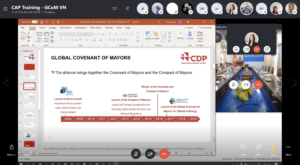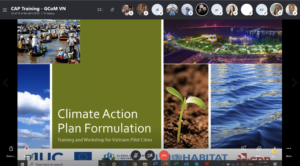Vietnam suffers from routine extreme weather events such as typhoons and tropical storms, sea level rise, land subsidence, and seawater intrusion. Over the past five decades, changing precipitation patterns have been visibly observed in different regions, average temperature has increased by 0.5°C throughout the country. Sea level rise and urban inundation are major climate threats and are expected to affect coastal zones, transport and other infrastructure, urban drainage systems and industrial parks. According to climate change projections, in the next 50 years Vietnam has a 40 percent chance of experiencing economic loss exceeding US$6.7 billion and a 20 percent chance of experiencing loss exceeding US$8.1 billion.
To address the negative outcomes of climate change, many local jurisdictions in the world are developing climate action plans (CAPs). Can Tho, as the largest city in the Mekong Delta, has committed to The Global Covenant of Mayors for Climate & Energy (GCoM) and pledge to develop CAP.

The CAP will demonstrate how the City will adapt and improve its resilience to climate hazards that impact the city today as well as risks that may increase in the coming years. IUC Asia plays a crucial role in the initiative of CAP development to provide technical and capacity support to Can Tho as one of the three Vietnam pilot cities.

On 06 May 2020, Can Tho organised a first series of capacity building workshop for city representatives on CAP development, supported by UN Habitat and CDP as IUC’s technical partners. The capacity building aimed to increase participants knowledge and appreciation on what CAP is, its usefulness, and how it is developed. In addition, it shared the general outline of a CAP and a possible the nuanced content that would be developed vis-à-vis the existing documents of the City. As coronavirus has continued to cripple businesses across the world, the workshop was carried out in semi online approach where IUC Asia, UN Habitat and CDP team joined remotely.

At the beginning of the session, UN Habitat highlighted the Mekong Delta is one of the most susceptible deltas in the world to sea level rise. About 39% areas will be inundated and 40.5% of total rice production loss if no measure taken. The time for bold action is now. In the next session, CDP went through the technical issues about the reporting process of CAP. The workshop will continue next week to accommodate a question and answer session.





